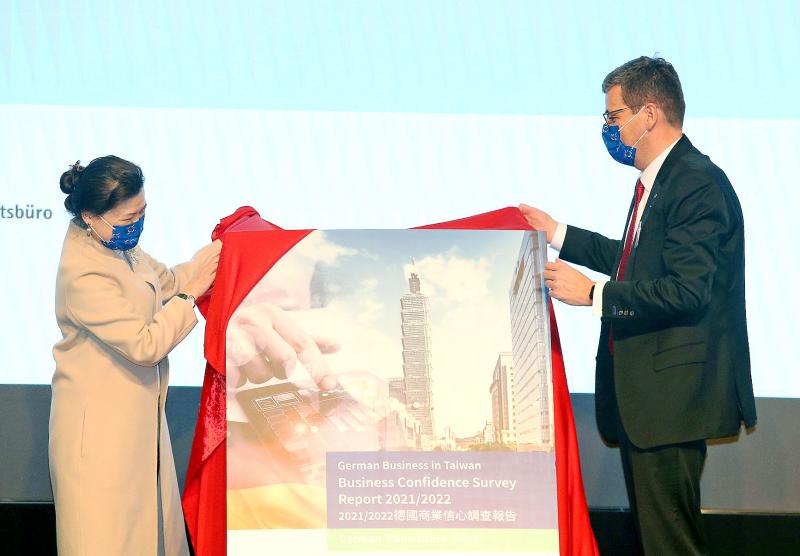A record number of German companies operating in Taiwan expect turnover to increase this year, although profit expectations were relatively low, an annual survey by the German Trade Office Taipei showed yesterday.
The survey showed that nearly 65 percent of German companies expect business to improve this year after 81.6 percent met their target last year and well-established firms continued to grow, the office said.
The survey, which was conducted among 251 companies from Dec. 6 last year to Jan. 18, showed that 28.8 percent generated revenue of NT$250 million to NT$1 billion (US$8.97 million to US$35.87 million) in the past few years, an increase of 9.6 percentage points from 2019.

Photo: CNA
It said that 21.9 percent reported revenue in excess of NT$1 billion, up from 19.2 percent in 2019.
Sixty-one percent of the firms said that they expect Taiwan’s economy to continue to improve this year, while 63.1 percent forecast the same for their own companies, the data showed.
Long-term commitment to Taiwan remains high among German companies, with 84.2 percent of respondents having established a presence more than five years ago, the survey said.
However, there are not many newcomers, which might indicate a decline in market entry appeal, it said.
“We recommend keeping a close eye on this trend and conducting further investigation,” German Trade Office Taipei Executive Director Axel Limberg said.
Travel restrictions and quarantine measures in Taiwan amid the COVID-19 pandemic have negatively affected business operations, weakening demand for products and services, and forcing cancelations of events, the office said.
German companies are not spared from the global economic slowdown and supply chain disruptions, it said, adding that 69.7 percent of respondents to the survey were affected by bottlenecks last year.
Negative effects might persist this year, it said.
The survey said that Taiwan’s domestic policy issues gained importance among German firms, with 34.2 percent expressing concern over energy transition and 32.9 percent mentioning digitalization.
Effective implementation of policies would become critical for German businesses to succeed in Taiwan, it said.

UNCERTAINTY: Innolux activated a stringent supply chain management mechanism, as it did during the COVID-19 pandemic, to ensure optimal inventory levels for customers Flat-panel display makers AUO Corp (友達) and Innolux Corp (群創) yesterday said that about 12 to 20 percent of their display business is at risk of potential US tariffs and that they would relocate production or shipment destinations to mitigate the levies’ effects. US tariffs would have a direct impact of US$200 million on AUO’s revenue, company chairman Paul Peng (彭雙浪) told reporters on the sidelines of the Touch Taiwan trade show in Taipei yesterday. That would make up about 12 percent of the company’s overall revenue. To cope with the tariff uncertainty, AUO plans to allocate its production to manufacturing facilities in

TAKING STOCK: A Taiwanese cookware firm in Vietnam urged customers to assess inventory or place orders early so shipments can reach the US while tariffs are paused Taiwanese businesses in Vietnam are exploring alternatives after the White House imposed a 46 percent import duty on Vietnamese goods, following US President Donald Trump’s announcement of “reciprocal” tariffs on the US’ trading partners. Lo Shih-liang (羅世良), chairman of Brico Industry Co (裕茂工業), a Taiwanese company that manufactures cast iron cookware and stove components in Vietnam, said that more than 40 percent of his business was tied to the US market, describing the constant US policy shifts as an emotional roller coaster. “I work during the day and stay up all night watching the news. I’ve been following US news until 3am

COLLABORATION: Given Taiwan’s key position in global supply chains, the US firm is discussing strategies with local partners and clients to deal with global uncertainties Advanced Micro Devices Inc (AMD) yesterday said it is meeting with local ecosystem partners, including Taiwan Semiconductor Manufacturing Co (TSMC, 台積電), to discuss strategies, including long-term manufacturing, to navigate uncertainties such as US tariffs, as Taiwan occupies an important position in global supply chains. AMD chief executive officer Lisa Su (蘇姿丰) told reporters that Taiwan is an important part of the chip designer’s ecosystem and she is discussing with partners and customers in Taiwan to forge strong collaborations on different areas during this critical period. AMD has just become the first artificial-intelligence (AI) server chip customer of TSMC to utilize its advanced

Six years ago, LVMH’s billionaire CEO Bernard Arnault and US President Donald Trump cut the blue ribbon on a factory in rural Texas that would make designer handbags for Louis Vuitton, one of the world’s best-known luxury brands. However, since the high-profile opening, the factory has faced a host of problems limiting production, 11 former Louis Vuitton employees said. The site has consistently ranked among the worst-performing for Louis Vuitton globally, “significantly” underperforming other facilities, said three former Louis Vuitton workers and a senior industry source, who cited internal rankings shared with staff. The plant’s problems — which have not